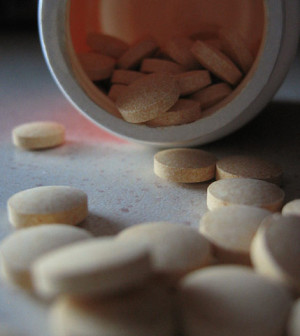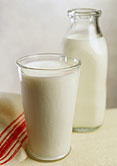- Double Mastectomy May Offer No Survival Benefit to Women With Breast Cancer
- Toxic Lead Found in Cinnamon Product, FDA Says
- Certain Abbott Blood Sugar Monitors May Give Incorrect Readings
- Athletes Can Expect High Ozone, Pollen Counts for Paris Olympics
- Fake Oxycontin Pills Widespread and Potentially Deadly: Report
- Shingles Vaccine Could Lower Dementia Risk
- Your Odds for Accidental Gun Death Rise Greatly in Certain States
- Kids From Poorer Families Less Likely to Survive Cancer
- Tough Workouts Won’t Trigger Cardiac Arrest in Folks With Long QT Syndrome
- At-Home Colon Cancer Test Can Save Lives
Diets High in Dairy Might Boost Colon Cancer Survival, a Bit


A diet rich in dairy products may slightly extend the lives of people diagnosed with colon cancer, a new study suggests.
But at least one cancer doctor not involved with the study was skeptical of the research and its conclusions.
The study found that people who ate the most dairy lived slightly longer and had a lower risk of dying from any cause.
“If you are a colorectal cancer patient, calcium and milk consumption may improve your survival. But do not change your diet just yet before more research is conducted,” said lead researcher Peter Campbell, who’s with the American Cancer Society’s epidemiology research program. The new study, he noted, showed only an association between dairy and survival — it could not prove that dairy consumption was the direct cause of increased longevity.
“If our findings are replicated in future studies, we may see changes in dietary guidelines for cancer survivors: patients might be encouraged to increase calcium and milk intake,” Campbell added.
But, Dr. Donald Abrams, an integrative oncologist at the University of California, San Francisco, and author of an accompanying journal editorial, had significant doubts about the study.
“It’s silly to look at milk in isolation, because [according to the study] the people who drank the most milk also were the leanest, did the most physical exercise, ate less red meat, and ate more fruits and vegetables,” he said. “The message is it’s the whole diet, not a single component.”
On a technical point, Abrams doesn’t believe that a study such as this is meaningful. “Investigators are going to try to write as many papers as they can from their data and chop it up into little reductionist pieces, when it’s much better to look at nutrition and diet more holistically,” he said.
The report was published online June 23 in the Journal of Clinical Oncology.
For the study, Campbell’s team collected data on almost 2,300 people diagnosed between 1992 and 2009 with colon cancer that had not spread beyond the colon.
By 2010, among those in the study, 949 patients had died — 408 from their cancer. The researchers found that those who ate the most dairy and therefore got the highest amount of dietary calcium lived slightly longer. The authors say their finding was “marginally statistically significant.”
In addition, those who drank the most milk had a 28 percent lower risk of dying from any cause, the researchers noted.
The study authors believe the survival benefit may be from the calcium in dairy, not the vitamin D. They also suggested that calcium may hinder cancer-cell growth and its ability to settle in sites far away from the original cancer.
What cancer patients eat does make a difference, Abrams noted. “They should eat a healthy diet and try to avoid the standard American diet,” he said.
Abrams would rather people skipped dairy altogether. Dairy is high in saturated fat, and affects hormones that might increase the risk of other cancers, he noted in his editorial.
“I believe dairy should be avoided by all people, let alone people with cancer,” he said.
Abrams noted that studies find that people diagnosed with colon cancer who eat “meats and sweets” don’t do as well in survival and cancer recurrence as patients who eat a diet rich in fruits and vegetables.
More information
For more about colon cancer, visit the American Cancer Society.
Source: HealthDay
Copyright © 2024 HealthDay. All rights reserved.










